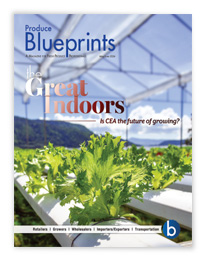EASTERN WASHINGTON—With a product 20+ years in the making, it’s not surprising Neil Carter, co-founder and president of Okanagan Specialty Fruit Inc., is thinking long term when it comes to building a new facility for the company’s bioengineered nonbrowning apples.
Carter headed up a blogger and trade media tour of the company’s growing operations in early October, and outlined plans for close to a million square feet of storage and processing.
“There are literally hundreds of thousands of bins of apples that leave this area that don’t get processed in this area,” he said. “We want to change that.”
To that end, OSF is breaking ground in November on the first 100,000 square feet – phase 1 – of a planned million square foot storage, packing and processing. Currently, OSF apples are trucked to Yakima to be stored and sliced.
“It’s a huge saving in terms of trucking and transport, but it’s also way better for the fruit, because now apples are traveling an hour and a half to Yakima, and they lose probably 3% of their weight on the trip,” he said.
The first phase is expected to be completed by the 2019 harvest, Carter said, just in time for the company to ramp up volume of Arctic Golden and Arctic Granny apples.
Production expansion
Summerland, British Columbia-based Okanagan Specialty Fruit harvested the bioengineered nonbrowning apples on 60 acres this year, and plans to triple that availability to 180 next year. By 2020, the harvest is expected to be up to 560 acres in Arctic Granny, Arctic Golden and, coming soon, Arctic Fuji.
Last season saw a pilot of packaged Arctic Golden sliced apples in about 400 retail locations, along with the launch of ApBitz dehydrated apple slices on Amazon.
This year, the company plans to offer sliced apples, bagged whole apples, ApBitz expansion to retail, and the first commercial availability of Arctic Granny apples.
Slicing and dehydration are two applications Arctic Apples are known for – they can be packaged without the addition of citric acid or any other agents to reduce browning, and while golden delicious and granny smith apples aren’t the darlings of the category, they were optimal fruit for the initial trials of this technology, Carter said.
First of all, they are widely available and not subject to licensing. Secondly, they bruise easily. They were a perfect application to show the picking, packing and processing benefits, he said.
A typical golden delicious apple orchard has about 15% culls, depending on conditions.
“We’ve seen 2-3% culls, which for goldens is really unheard-of,” Carter said. “That includes sun burning and bird pecks.”
With increased pack out and reduced damage in transport, OSF hopes that message will resonate with growers, as well as buyers, as it looks to expand operations into other areas. So far, there’s a wait and see approach from many.
“They say ‘We wish you well. It’s pretty cool. We’ll be second. We don’t want to be leading that charge,’” Carter said.
Carter has been leading this charge for more than two decades. He and Louisa Carter founded the company in 1996. The first two bioengineered apples – the enzyme that causes apples to brown has been silenced – weren’t approved for release until 2015, and Arctic Fuji was approved earlier this year.
It’s an exciting time, to see the hard work go to market, Carter said.
—————–
Pamela Riemenschneider is the Retail Editor at Blue Book Services, Inc.


